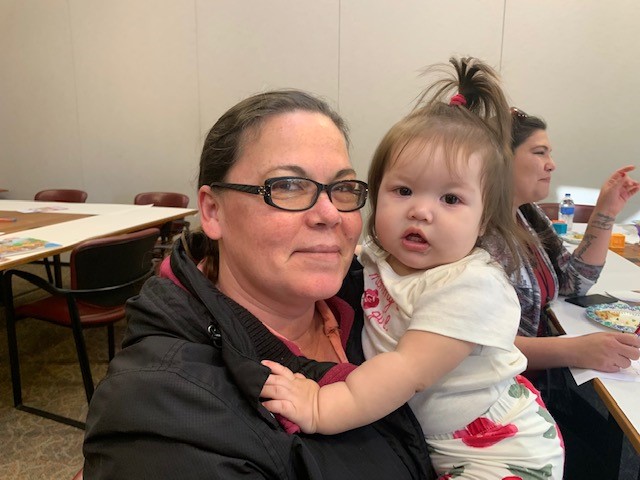
“What I like about the program is that they’re very hands on with families. They do visits and educational activities at home. They have group meetings where all the families come and special guests come. We learn about how the child’s brain develops through music and singing and how it’s good for both parents to be involved.”
- Family Spirit Participant
Program Description
United Indian Health Services, Inc. (UIHS) developed and implements a comprehensive and culturally appropriate program, Keet-kah ‘Ne Chyue (Strong Family). Along with comprehensive connection to resources for participants, the program uses the Family Spirit curriculum, delivered through group parenting classes and home visits, to improve outcomes for expecting or parenting American Indian teens, mothers, fathers, and their families. UIHS aims to meet the prenatal, postpartum, and parenting needs of expectant and parenting American Indians, with particular attention to supporting victims of domestic violence, sexual assault, sexual harassment, and stalking.
Program Snapshot
- Population: American Indians ages 12 and up who are expectant or parenting teens, mothers, fathers, and their families
- Location(s): Humboldt and Del Norte Counties, CA
- Partners: Mad River Community Hospital; St. Joseph Hospital; Sutter Coast Hospital; the Temporary Assistance for Needy Families (TANF) program; Tribal social services and domestic violence services; Yurok, Howonquet, and Elk Valley Tribal Head Start schools; and other local health, education, and social service organizations
Goals
- Meet the prenatal, postpartum, and parenting needs of all eligible participants
- Foster strong families by supporting parents in making healthy lifestyle choices, using nurturing parenting practices, and securing fulfilling employment
- Connect participants to local resources, including services for victims of domestic violence, sexual assault, sexual harassment, and stalking
- Create a comprehensive local support network for participants to assist them through pregnancy and parenthood
Strategies
Group classes and home visits
Community Health Representatives (CHRs) deliver the Family Spirit curriculum to clients through group classes, home visits, or both, depending on participants’ preference. The curriculum covers six domains: prenatal care, infant care, child development, toddler care, life skills, and healthy living. Through activities and group discussions alongside guest local experts, families learn skills for all stages of parenthood. Transportation to and from the group classes are provided to families, and every class includes a healthy lunch and a take-home recipe for participants and their children.
Traditional tribal teachings are woven throughout the curriculum, as cultural teachings are thought to promote maternal and child health in American Indian communities. For example, lessons on safe sleep incorporate information about baby baskets, which local tribes use to keep their babies safe and secure while they’re sleeping.
Connections to resources
CHRs maintain close relationships with Keet-kah ‘ne chyue participants, allowing them to connect participants to resources as needed—even if participants only attend the program through group classes, they receive one-on-one time with a CHR during which they can communicate the need for resource connections. United Indian Health Services offers in-house medical, dental, and behavioral health care; nutrition support; other health and wellness services; and concrete supports, such as diapers and baby books. What they cannot offer to participants under their own roof, they find through partner organizations.
The program prides itself on connecting their participants to resources in a more personal way than a typical referral. CHRs will help clients every step of the way, including in making the phone call to set up an appointment or accompanying them. If participants who are victims of domestic violence, sexual assault, sexual harassment, or stalking need to check in to a safe house, CHRs will accompany them to check in and hold their home visits at the safe house for the duration of the participant’s time there.

“I would recommend all my family and friends to go to these groups; they’re very helpful for anybody that’s got children or expecting a baby.”
- Family Spirit Participant
Stats at a Glance
- 1,326 maternal child health visits held between July 1, 2018 and June 30, 2019
- 236 Keet-kah ‘ne chyue clients served as of June 30, 2019
- 22 Strong Family groups held between January 1, 2019 and June 30, 2019
Grantee Information
Theressa Greene
Public Health Nurse Manager
707-825-4085
theressa.green@crihb.org
http://unitedindianhealthservices.org
Print the full success story here - PDF. (Content is undergoing 508 review and will be updated pending remediation. For immediate assistance, please contact: opa@hhs.gov.)
About the PAF Program
The Office of Population Affairs Pregnancy Assistance Fund (PAF) Program provides funding to states and tribal entities to improve the health, educational, social, and economic outcomes of expectant and parenting teens, women, fathers, and their families.
